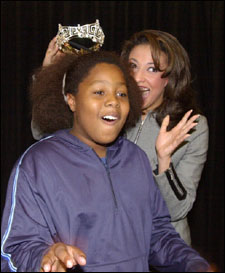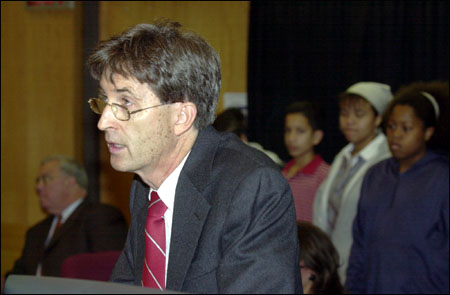Menino, Miss America help SPH mark gun violence ‘Day of Concern’:
Children across country take anti-violence pledge

Boston Mayor Thomas Menino and reigning Miss America Erika Harold joined Harvard School of Public Health faculty and students from Boston’s Mission Hill School to mark a National Day of Concern about youth gun violence Thursday (Oct. 24).
The event was held at the School of Public Health and moderated by Deborah Prothrow-Stith, co-director of the Harvard Youth Violence Prevention Center and professor of public health practice. It’s part of a national movement to get young people working to effect change in their own schools, neighborhoods, and homes. Along with children across the country, a group of students from Mission Hill School took a pledge that they would never bring a gun to school, never use a gun to settle a dispute, and try to influence their friends to do the same.
“Today millions of young people will take the pledge to refrain from using a gun in resolution of their conflicts,” Harold said. “They are taking the first step and being leaders to create a more peaceful society and to create the awareness that no longer are we willing to accept violence in the resolution of conflicts.”
Harold, who is entering Harvard Law School in the fall, has made calling attention to the problem of youth violence the focus of her year with the Miss America title.
“I tell them [students], you cannot wait for lawmakers to change the laws, you cannot wait for your parents to take initiative. You have to decide as a generation that you want to be the ones to start change and to be the catalyst for that,” Harold said.

Professor of Health Policy David Hemenway, who is also co-director of the Harvard Youth Violence Prevention Center, said that research in California has shown that children as young as seventh-graders are bringing guns to school. They’re doing it, he said, out of fear of violence. When polled, students say that guns are easy to get and that they’d rather live in a world where guns were impossible to get.
“Our key goal is to try to build a society where it is safe for teenagers, so nobody wants to carry a gun,” Hemenway said.
Hemenway said that in states and countries where guns are available to youths, they are invariably the cause of more violent deaths, both homicides and suicides.
An obstacle that needs to be overcome, Hemenway said, is a lack of standardized national data on teen violence. One thing the center is doing is helping the Centers for Disease Control create a national violent death reporting system to create standard reporting guidelines. This will help pinpoint the problem so that policies can be created to combat it.
Menino praised the work going on in the city – from the School of Public Health to the Mission Hill School to the many neighborhood and social organizations fighting the problem.
Education and legislation are critical to fighting gun violence, he said, as is a united effort such as the National Day of Concern.
“Today we band together to renew our commitment to ourselves and to each other,” Menino said. “We cannot allow ourselves to get complacent. Every day an average of nine children die of gunshot wounds in America, that’s one child every two and a half hours…. In Boston we know that behind those statistics are real people whose families are really being torn apart by the violence.”
The event preceded the Boston “Peace Party,” held Oct. 25 at the School of Public Health. The Peace Party paid tribute to 28 youth and adults working to curb violence in their neighborhoods.




